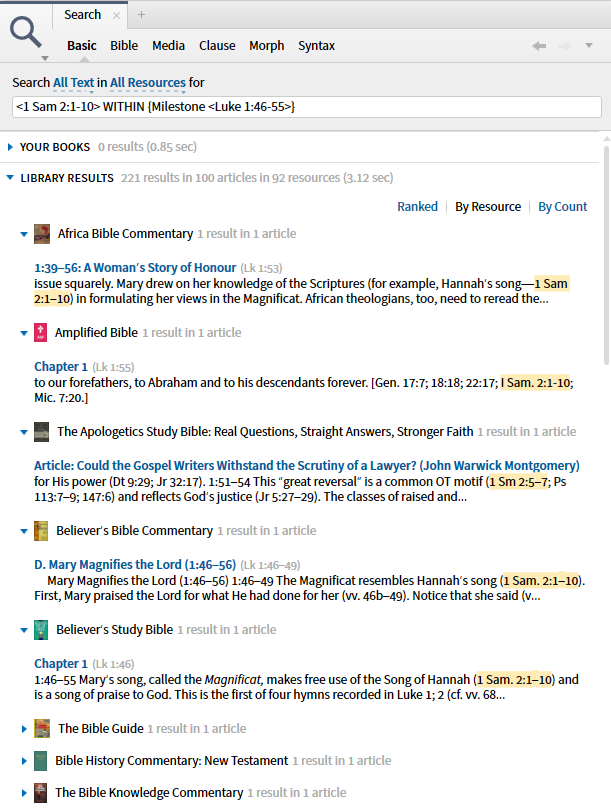One often reads that Mary's song in Luke 1:46-55 has parallels to Hannah's Song in 1 Sam 2:1-10. How do I search for information about the parallels?
1. Method 1: I can simply look for a reference from Luke 1:46-55 that is NEAR a reference from 1 Sam 2:1-10. The full form would be something like <BibleNRSV ~ Luke 1:46-55> but the Bible datatype will be recognized by Logos and ~ is the default operator so that I can simplify the search to <Luke 1:46-55> NEAR <1 Sam 2:1-10>

2 Method 2: If I want to limit my search to text where the Magnificat is explicitly the subject of the commentary, there is a more specific search.
Background:
What is it?
"Milestones" are how Logos resources are organized; if you type a reference into the reference box (at the top-left of a resource panel), you're navigating to that milestone within the resource. Logos 6 introduces "{Milestone <Reference>}" search syntax to find these milestones in search results.
How does it work?
While <John 3:16> finds all references to John 3:16, {Milestone <John 3:16>} finds all instances of John 3:16; these could be that verse in a Bible, or a discussion of that verse in a commentary. (This search basically returns the same results as the Commentaries section in the Passage Guide.)
You can use any reference supported by the resources in your library; for example, {Milestone <ApostolicFathers I Clement 1>} finds all texts that include 1 Clem 1.
Let me give you an example that's I've just used for tonight's study. I was speaking about angels, and I wanted to say a little something about guardian angels. I was particularly interested in what commentators said about guardian angels in relation to Matthew 18:10 ("in heaven their angels always see the face of my Father").
So, I searched for "guardian angel" WITHIN {Milestone <Matt 18:10>}. That looks for the phrase "guardian angel", but in the part of commentaries/bible that are dealing with Matthew 18:10. It excludes commentaries on Matthew 18:10 that don't discuss guardian angels, and it excludes books that speak about guardian angels in other contexts. It got me instantly to exactly what I wanted.

So in this case I want to search WITHIN {Milestone <Luke 1:46-55>} to be looking at text sections where the Magnificant is the primary topic of discussion.

Note that the Amplified Bible did not appear in the first search but does in the second - specifically because I am looking for milestones rather than references. And I did not pick up the Academic Sermons which appeared in the first search because it contains only references.
3. Method 3: If I want to cast a very wide net, I can combine the two searches by putting each individual search in parens and inserting an OR between them giving (<Luke 1:46-55> NEAR <1 Sam 2:1-10>) OR (<1 Sam 2:1-10> WITHIN {Milestone <Luke 1:46-55>})

4. Method 4: If I want a quick and dirty method to find just a few references, I can simply look for ("Hannah's Song", "Song of Hannah") NEAR (Magnificat, "Mary's Song", "Song of Mary"). Why lists? Remember the wiki:
5. Lists
Lists are used to specify alternative search items in a compact form. For example (who, whoever, whom) is a list that will match who or whoever or whom.
Parentheses ( ) are optional in simple searches.
Note you must use a list with proximity operators e.g. (who, whoever, whom) NEAR Christ because (who OR whoever OR whom) NEAR Christ will give incorrect results.
Note logical operators within a list will give incorrect results e.g. ((God AND love), (Jesus AND peace))
